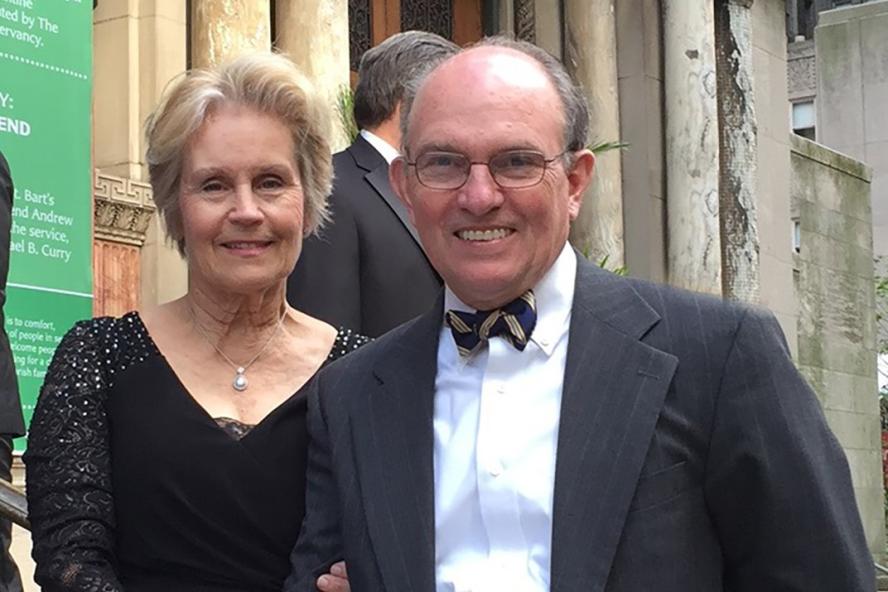-
About
- Departments & Offices
-
Academics
- Physician Assistant
- Special Master’s (MBS)
-
Admissions & Financial Aid
- Tuition & Fees
-
Student Life
-
- Student Resources by Program
- Academic & Student Support
- Wellness & Wellbeing
- Student Experience
- Events & Traditions
-
-
Research
- Research Labs & Centers
-
Local & Global Engagement
- Global Health Programs
- Community Engagement
Paul Thompson, A69, M73 and Camilla Bessey Thompson, J70
The Thompson Sim Center will enable today’s Tufts medical students to practice the fundamental skills they’ll need for patient care.

In the summer of 2022, Tufts University School of Medicine was honored to receive a gift from Paul (A69 M73) and Camilla (J70) Thompson to name the Camilla Bessey Thompson and Paul D. Thompson, MD Clinical Skills and Simulation Center. This facility provides Tufts medical students and faculty with 21st century teaching and learning spaces of the highest caliber, including state-of-the-art, case-based simulation technology—a core aspect of contemporary medical education. Their gift is made in celebration of Paul’s upcoming 50th Reunion with the Class of 1973.
“We are thrilled to contribute to the Clinical Skills and Simulation Center,” says Paul. “Teaching is a great way to improve medical care and simulation is a great way to teach. We wanted to demonstrate our gratitude to Tufts for the excellent clinical training I received. “
Both Paul and Camilla attended Tufts as undergraduates, Paul graduated from Tufts medical school and completed his third-year clerkships at the Maine Medical Center. Today, Paul is a globally-recognized expert in exercise cardiology whose broad-ranging career has included clinical care, research, and television commentary for events like the New York City Marathon and the 1988 Olympics.
Paul says he has had the good fortune to combine his avocation for competitive distance running with his vocation of cardiology. “In that sense, I’ve never really worked.” Competitive running has been part of his life since his undergraduate days when he was the captain of the 1968 cross-country team. As a senior, Paul finished 25th in the 1969 Boston Marathon. As a medical student, he set a goal of qualifying for the 1972 Olympic marathon trials and trained by running the six miles twice a day between their home in Portland, and the Maine Medical Center. Both remember the hard work of that period, and the “firsts” Paul experienced as a young doctor.
“I remember the day that Paul delivered a baby for the first time, and what an exhilarating experience it was to help bring a new life into the world,” says Camilla, as well as to care for patients through serious illness and even the end of life.
A seminal moment in Paul’s career came in September 1979, soon after his cardiology fellowship at Stanford. His research paper on fatal cardiac events among runners was slated for publication in the Journal of the American Medical Association, the same week that President Jimmy Carter collapsed from heat exhaustion during a six-mile race. To his surprise, Paul found his research featured on the front page of The New York Times alongside coverage of President Carter’s collapse. “I went from being nobody to someone who was known as an expert in the cardiac complications of exercise.” Paul says. In the decades to come, Paul continued to conduct leading research in exercise cardiology, publishing hundreds of papers in the field. His research has explored rare complications associated with distance running, such as myocardial fibrosis as well as apparent benefits, like higher HDL “good” cholesterol, and he has shared his knowledge in popular media outlets, like Runner’s World magazine, and ABC Sports. As Paul’s career grew, Camilla also worked in the health care sphere, including roles at Stanford Health Care’s heart disease prevention program, and the American Heart Association in Rhode Island. Together the Thompson’s raised two daughters and two sons. Today, Paul and Camilla reside in Connecticut where Paul is Chief of Cardiology—Emeritus at Hartford Hospital, Professor of Medicine, Emeritus at the University of Connecticut, and a part time cardiologist at Massachusetts General Hospital.
Paul and Camilla are delighted that The Thompson Sim Center will enable today’s Tufts medical students to practice the fundamental skills they’ll need for patient care. Camilla hopes it will allow students to immerse in the tactile and technical aspects of care, as well as the skills of communication and trust. “The relationships you form with patients are always deeply impactful,” she says.
Family relationships are at the root of the gift for both Paul and Camilla. “My father was a Baptist minister,” says Paul, “and one of his guiding values was that you should always leave things a little better than you found them.” By including Camilla’s maiden name in their gift, the Thompson’s also celebrate her parents who in Paul’s words, “were wonderful people.”
Advances in simulation training have created “wonderful new ways to learn,” says Paul. “I’m a bit envious of the students,” he admits. “They are going to learn so much more, and know so much more that I do. I just hope they have as much fun, and find as much joy in medicine as I have. Overall, it’s been a wonderful journey.”